Related Research Articles

The illegal drug trade, drug trafficking, or narcotrafficking is a global black market dedicated to the cultivation, manufacture, distribution and sale of prohibited drugs. Most jurisdictions prohibit trade, except under license, of many types of drugs through the use of drug prohibition laws. The think tank Global Financial Integrity's Transnational Crime and the Developing World report estimates the size of the global illicit drug market between US$426 and US$652 billion in 2014 alone. With a world GDP of US$78 trillion in the same year, the illegal drug trade may be estimated as nearly 1% of total global trade. Consumption of illegal drugs is widespread globally, and it remains very difficult for local authorities to reduce the rates of drug consumption.

The Federal Bureau of Narcotics (FBN) was an agency of the United States Department of the Treasury, established in the Department of the Treasury by an act of June 14, 1930, consolidating the functions of the Federal Narcotics Control Board and the Narcotic Division. These older bureaus were established to assume enforcement responsibilities assigned to the Harrison Narcotics Tax Act of 1914 and the Jones–Miller Narcotic Drugs Import and Export Act of 1922.
The Golden Crescent is the name given to one of Asia's two principal areas of illicit opium production. Located at the crossroads of Central, South, and West Asia, this space covers the mountainous peripheries of Afghanistan and Pakistan, extending into eastern Iran.
Chhota Shakeel Is an Indian crime boss and a high-ranking leader of the D-Company, a criminal group based in South Asia. He joined the D-Company in 1988 under the kingpin Dawood Ibrahim, and was reportedly responsible for managing the day-to-day operations of the criminal group. Shakeel became one of the most-wanted men in India after his alleged participation in the 1993 Bombay bombings. He is also wanted by the U.S. government for international drug trafficking.

The United States Central Intelligence Agency (CIA) has been accused of involvement in the trafficking of illicit drugs. Books and journalistic investigations on the subject that have received general notice include works by the historian Alfred McCoy, professor and diplomat Peter Dale Scott, journalists Gary Webb and Alexander Cockburn, and writer Larry Collins. These claims have led to investigations by the United States government, including hearings and reports by the United States House of Representatives, Senate, Department of Justice, and the CIA's Inspector General. The various investigations have generally not led to clear conclusions that the CIA itself has directly conducted drug trafficking operations, although there may have been instances of indirect complicity in the activities of others.

The Golden Triangle is a large, mountainous region of approximately 200,000 km2 (77,000 sq mi) in northeastern Myanmar, northwestern Thailand and northern Laos, centered on the confluence of the Ruak and Mekong rivers. The name "Golden Triangle" was coined by Marshall Green, a U.S. State Department official, in 1971 in a press conference on the opium trade. Today, the Thai side of the river confluence, Sop Ruak, has become a tourist attraction, with an Opium Museum, a Hall of Opium, and a Golden Triangle Park, and no opium cultivation.
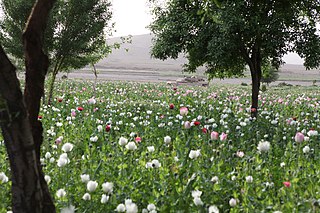
Afghanistan has long had a history of opium poppy cultivation and harvest. As of 2021, Afghanistan's harvest produces more than 90% of illicit heroin globally, and more than 95% of the European supply. More land is used for opium in Afghanistan than is used for coca cultivation in Latin America. The country has been the world's leading illicit drug producer since 2001. In 2007, 93% of the non-pharmaceutical-grade opiates on the world market originated in Afghanistan. By 2019 Afghanistan still produced about 84% of the world market. This amounts to an export value of about US $4 billion, with a quarter being earned by opium farmers and the rest going to district officials, insurgents, warlords, and drug traffickers. In the seven years (1994–2000) prior to a Taliban opium ban, the Afghan farmers' share of gross income from opium was divided among 200,000 families.
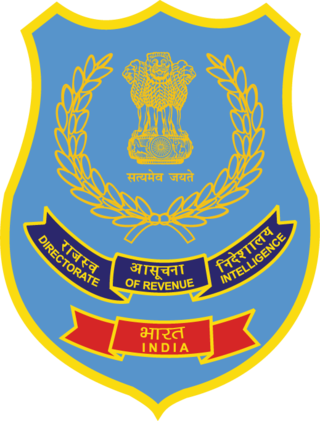
The Directorate of Revenue Intelligence (DRI) is an Indian intelligence agency. It is India's apex anti-smuggling intelligence, investigations and operations agency.

The Anti-Narcotics Force is a federal executive bureau and a paramilitary force of the Government of Pakistan, tasked with combating the narcotics smuggling and use within Pakistan. ANF works under the umbrella of Pakistan Army and Ministry of Narcotics Control (Pakistan) of which Shahzain Bugti is the minister since March 2022. Due to misconception on Section 4 of ANF ACT 1997, the force's head consisted of the active-duty general officer of Pakistan Army. Although the law prescribes that any competent person may be appointed as Director-General. Currently, a two-star Army Officer, Major general Muhammad Aniq Ur Rehman Malik is deputed as Director-General. The ANF also has sole responsibility for coordinating and pursuing Pakistan narcotics investigations abroad.
The French Connection was a scheme through which heroin was smuggled from Indochina through Turkey to France and then to the United States and Canada. The operation started in the 1930s, reached its peak in the 1960s, and was dismantled in the 1970s. It was responsible for providing the vast majority of the heroin used in the United States at the time. The operation was headed by Corsicans Antoine Guérini and Paul Carbone. It also involved Auguste Ricord, Paul Mondoloni and Salvatore Greco.
The illegal drug trade in China is influenced by factors such as history, location, size, population, and current economic conditions. China has one-sixth of the world's population and a large and expanding economy. China's large land mass, close proximity to the Golden Triangle, Golden Crescent, and numerous coastal cities with large and modern port facilities make it an attractive transit center for drug traffickers. Opium has played an important role in the country's history since before the First and Second Opium Wars in the mid-19th century.
This article deals with activities of the U.S. Central Intelligence Agency related to transnational crime, including the illicit drug trade.
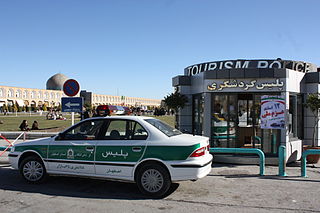
Crime in Iran is present in various forms, and may include the following offences: murder, kidnapping, theft, fraud, money laundering, drug trafficking, drug dealing, alcohol smuggling, oil smuggling, tax evasion, terrorism, not wearing "proper" hijab, eating and drinking during Ramadan, drinking alcohol, and many other crimes.
The 14K (十四K) is a triad group based in Hong Kong but active internationally. It is the second largest triad group in the world with around 20,000 members split into thirty subgroups. They are the main rival of the Sun Yee On, which is the largest triad.

David McMillan is a British-Australian former drug smuggler who is the only Westerner on record as having successfully escaped Bangkok's Klong Prem prison. His exploits were detailed in several books and in the 2011 Australian telemovie Underbelly Files: The Man Who Got Away.
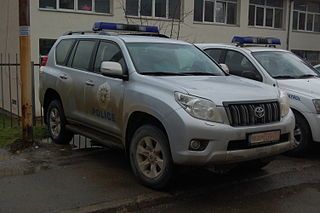
Kosovo within communist Yugoslavia had the lowest rate of crime in the whole country. Following the Kosovo War (1999), the region had become a significant center of organized crime, drug trafficking, human trafficking and organ theft. There is also an ongoing ethnic conflict between Kosovar Albanians and Kosovan Serbs. The large Kosovar diaspora which had built up in Western Europe during the 1990s, combined with the political instability, created ideal conditions for Kosovo to become "Europe's crime hub"; well into the 2000s, Kosovo remained associated with both ethnic conflict and organized crime. A Kosovo Police service has been built up under UN administration, beginning in 1999. It had an operational force of 7,000 officers in 2004, and further expanded to 9,000 by 2010. The deplorable crime rate led to an additional deployment of civilian law enforcement resources of the European Union to Kosovo, under the name of European Union Rule of Law Mission in Kosovo in 2008. Originally scheduled for two years, the duration of the deployment was extended twice, as of September 2012 scheduled to last until 2014.

Slovakia is a Central European country with a history of relatively low crime. While crime became more widespread after the Revolutions of 1989, it remains low when compared to many other post-communist countries.
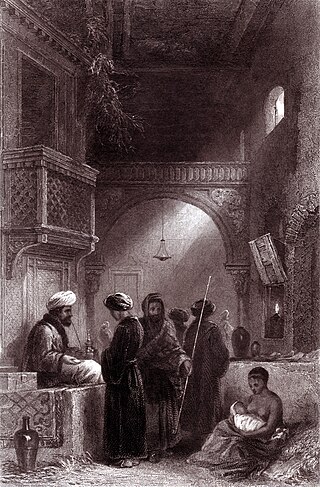
The illegal drug trade in Turkey has played a significant role in its history. Turkish authorities claim that Drug trafficking has provided substantial revenue for illegal groups such as the Kurdistan Workers' Party (PKK), particularly through marijuana cultivation in south-eastern Turkey, and the 1996 Susurluk scandal showed substantial involvement in drug trafficking on the part of the Turkish deep state. The French Connection heroin trade in the 1960s and 70s was based on poppies grown in Turkey.
Maritime drug smuggling into Australia refers to the smuggling of illicit drugs into Australia by sea. While much contemporary Australian media coverage has focused on smaller, more personalised smuggling cases such as the Bali Nine, maritime drug smuggling often allows criminal groups to move illicit drugs and substances into Australia at a much greater scale. This has happened through a variety of ways, including via cargo ship, yacht, and fishing vessels. Key departure locations for drugs aimed to be smuggled into Australia include China, India, Southeast Asia, and the Americas, with much of the drugs trafficked via countries and territories in the South Pacific, in close proximity to Australia.
Drug smuggling is an issue that is gaining international attention, particularly in the Indian Ocean region. The Indian Ocean borders 24 states, and accounts for a third of the world’s ocean area. Previously, other challenges, such as Somali piracy, have been at the forefront of international action. However, the utilisation of the Southern route by drug traffickers, and the consequent issues this has caused, has led to increased focus on how to tackle this issue.
References
- 1 2 Schneider, Stephen, Ph.D.; Beare, Margaret, Ph.D.; Hill, Jeremy, LL.B. (March 31, 2000) Alternative Approaches to Combating Transnational Crime. Archived 2006-12-31 at the Wayback Machine Page 119.
- 1 2 3 4 Dragoon, Alice. (June 15, 2000) CNN The Man from Interpol: Is Director Peter Nevitt is the enemy of all the world's thugs, and IT is his weapon. Republication of CIO Magazine article by CNN.
- 1 2 Interpol (1998) 1998 Annual Activity Report. Archived 2006-12-08 at the Wayback Machine .pdf Page 14;Report page 12.
- ↑ Czech News Agency. April 20, 2000. Komorous confirms correctness of French report on drugs.( World News Connection Archived 2007-01-18 at the Wayback Machine (April 20, 2000) Anti-Drugs Squad Chief Confirms French Report Correct.)
- ↑ Interpol (1999) 1999 Annual Activity Report. Archived 2006-12-09 at the Wayback Machine Page 24.